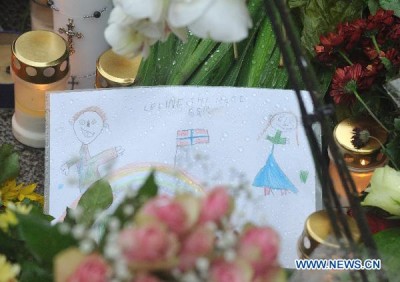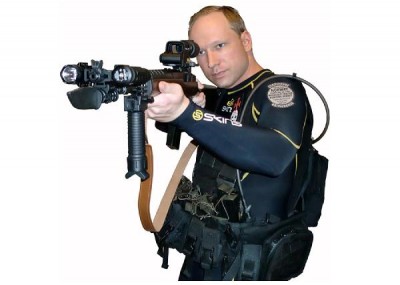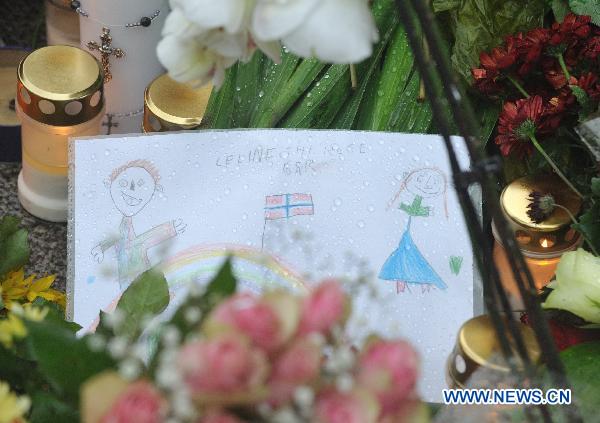Devapriyo Das, Yang Jingzhong
OSLO, July 24 (Xinhua) — Norway has plunged in grief as its people come to terms with life after the massive bomb blast and shooting spree on Friday killed at least 93 people.
Across Oslo, the Norwegian capital, makeshift memorials have been put up by residents near the sites damaged by the blast, and at key locations such as the country’s parliament and royal palace.
Flowers were offered and candles lit in remembrance of the 93 persons killed so far in what are described as the country’s worst attacks since World War II.
The Norwegian national flag flew at half-mast in honor of the victims.
REMEMBRANCE AFTER SHOCK
“Today we allow ourselves to honor and remember the dead,” Norwegian Prime Minister Jens Stoltenberg said Sunday at a memorial service for the victims at Oslo Domkirke, the city’s historic cathedral.
The service was also attended by Norway’s King Harald and Queen Sonja, as well as the country’s top politicians.
“Each and every one that is taken away from us is a tragedy. And altogether, this is a national tragedy,” Stoltenberg said.
He added he was proud to live in the country that showed courage in the midst of such difficulty.
Outside, at least 2,000 people lined the streets leading to the cathedral, whose spire loomed against an overcast sky. Despite the crowds, the atmosphere was somber and quiet.
“It is very, very quiet today in Oslo. This is not usual. It seems like this has affected all the people here,” said Asbjorn Bergseng, a resident who stood with mourners in front of the cathedral.
The feeling of quiet shock was felt by others like Marit Nicolaysen, who said Friday’s tragedy made her “feel like other Norwegians: very, very sad.”
But she added, “I think we all stand together in this situation. We do not know what this will mean for our society but are hoping for the best.”
Above all, few people can imagine that an attack of this nature could happen in peaceful Norway.
“We are not used to dealing with anything like this,” said Christina Oerwen, a Swedish citizen living in Oslo. “It is something you never thought would happen in this part of the world.”
But the facts of the case are indeed shocking. On Friday, a massive explosion rocked downtown Oslo, killing seven and damaging key government buildings including the offices of the prime minister.
Hours later, a gunman dressed in police uniform blasted his way across the tiny island of Utoeya, some 40 km west of the capital, in an orgy of violent shooting that left 86 persons dead.
At the time, the island was hosting a summer camp for the youth wing of Norway’s ruling Labour Party. Stoltenberg himself had been scheduled to address the attendees, most aged between 14 and 19 years old, on Saturday.
“It is impossible to comprehend, it is like a nightmare. Words cannot express how I feel,” Stoltenberg told a press conference Saturday.
Although shattered glass litters the worst-hit streets, and buildings with blown-out windows are clearly visible, clean-up operations are well underway.
SOLIDARITY
Oslo residents are also keen to express solidarity with the victims and show that life must continue as normal. Several of them spoke to Xinhua Saturday, about how they felt in the immediate aftermath of the attacks.
“I feel absolute disbelief and shock,” said Hildegunn Toftning, who was attending an impromptu public-led memorial for victims at the steps of Oslo Domkirke, along with her children.
“Who could possibly do something like this?” she said.
“From what we heard, this is the work of a very, very sick person. And that is what it takes to do something like this, I believe,” she added.
In fact, Norwegian police have arrested the lone gunman and identified him as Anders Behring Breivik, a 32-year-old Norwegian with extreme right-wing and conservative Christian beliefs. He is also said to be responsible for the bomb blast.
Now, there is a feeling that the country must come together for peace.
About a kilometer away, in front of Norway’s Royal Palace, a teenage student from Azerbaijan sat on the pavement making posters with the words: ‘Nei til terror’.
“In Norwegian, it means ‘no to terror’,” said the student who gave his name as Amir. “This event has stressed us. Nobody wants this to happen again … nobody wants any terror, any blood or guns.”
Norway is a country of just 4.8 million people, and its citizens regard themselves as a close-knit community with liberal values and a reputation for transparency in public life.
The country has been led by socialist parties since World War II, and it has a history of being a peace broker and mediator in overseas conflicts such as in the Middle East and Sri Lanka.
Its healthy economy is underpinned by vast off-shore oil reserves and the country’s social policies make it one of the world’s richest welfare states.
This is a country that is proud of what it has achieved and wants to maintain its reputation as an open-society.
“I still feel safe in Oslo because it is one of the best and safest cities in the world. Nothing can change my mind,” Amir noted.
These thoughts were echoed by Per Arne Dahl, a priest at the local Trinity Church and Chaplain at Stortinget, the Norwegian Parliament.
“We have always felt Norway is an open and safe country, so this is a new experience for us,” he said.
“It will lead us into new debates, new reflections on how we can take care of the freedom and openness we have, and at the same time, protect us against evil and terrorism,” he added.

A picture of Anders Behring Breivik taken from a book downloaded from a link posted on the Norwegian discussion website, www.freak.no, and entitled "2083 - A European Declaration of Independence", is seen in this screen grab made July 23, 2011. (Xinhua/Reuters Photo)
Suspect admits carrying out Oslo attacks:
The suspect in Friday’s bomb attack and shooting massacre in Oslo, Norway, has admitted responsibility and will appear in a court here Monday, according to authorities and his lawyer.
Anders Behring Breivik, 32, will appear before the judges to “explain himself.” If convicted, he could face a maximum sentence of 21 years in jail, authorities say.
“He is prepared to testify in open court about his motives and why he committed the actions he has admitted to,” Geir Lippestad, Breivik’s defense attorney, told reporters Sunday.
Earlier on Saturday, Lippestad said Breivik “has admitted it was atrocious to have performed these actions, but in his own head, it was necessary.”
Norwegian police have confirmed Breivik’s admission and said he claimed to have acted alone.
“He has admitted that he was responsible for the bomb attack and for the killing of people on Utoeya island,” a police spokesman told a press conference in Oslo on Sunday.
Police said Breivik did not resist when armed officers arrested him on the tiny holiday island of Utoeya 40 km west of Oslo.
By that time, he had killed 86 people, mostly teenagers attending a summer camp for the youth wing of Norway’s ruling Labor Party, in a shooting spree that lasted about 90 minutes, according to eye witnesses.
An off-duty policeman was among those killed in a shootout, according to Sigve Bolstad, chairman of the Oslo Police Association.
Breivik is also held responsible for Friday’s massive bomb blast in downtown Oslo that killed seven people and damaged key government buildings including the office of the Norwegian prime minister.
Moreover, a total of 97 others have been wounded in the twin attacks.
But Lippestad told Norwegian public broadcaster NRK that while admitting his actions were “atrocious,” Breivik “feels that what he has done does not deserve punishment.”
It is still unclear what his motives were, and authorities are unwilling to publicly speculate about it.
“I will not comment or speculate on the motives because it is very important not to jump to conclusions and to await the results of the on-going investigation,” Norwegian Prime Minister Jens Stoltenberg told journalists on Sunday, following a visit to the bomb-damaged government quarters.
An off-duty policeman was among those killed in a shootout, according to Sigve Bolstad, chairman of the Oslo Police Association.
Breivik is also held responsible for Friday’s massive bomb blast in downtown Oslo that killed seven people and damaged key government buildings including the office of the Norwegian prime minister.
Moreover, a total of 97 others have been wounded in the twin attacks.
But Lippestad told Norwegian public broadcaster NRK that while admitting his actions were “atrocious,” Breivik “feels that what he has done does not deserve punishment.”
It is still unclear what his motives were, and authorities are unwilling to publicly speculate about it.
“I will not comment or speculate on the motives because it is very important not to jump to conclusions and to await the results of the on-going investigation,” Norwegian Prime Minister Jens Stoltenberg told journalists on Sunday, following a visit to the bomb-damaged government quarters.
PROFILE OF THE SUSPECT
Breivik is described as an ethnic Norwegian. Photos of him on social networking sites and local media show him with pale, clean-cut features and straight blonde hair.
According to messages posted on social networking sites and statements made to Norwegian media by persons who know him, Breivik, a conservative Christian, holds extreme right-wing views.
He enjoys weightlifting, video-games and hunting, holds strongly nationalist and anti-Muslim views, and is against multiculturalism.
Breivik posted a 1,500-page manifesto on the Internet Friday, describing the planning of the attacks and his personal philosophy.
Online searches revealed that Breivik has previously been in contact with far-right groups in Britain. He has also made derogatory remarks about leading Norwegian politicians.
According to Norwegian media, Breivik’s parents divorced when he was very young and he has subsequently had almost no contact with his father, who now lives in southern France.
Both his father and mother said they are bewildered and appalled to hear of their son’s violent actions.
Breivik had studied at an Oslo-based business college, and wanted to be an entrepreneur. But after failing at several businesses, he moved out of Oslo in 2009 and set up a farm in Asta, some 130 km north of the capital.
Police say six tons of fertilizer were delivered here in May and believe they may have been used in making explosives for Friday’s bomb attack.






















